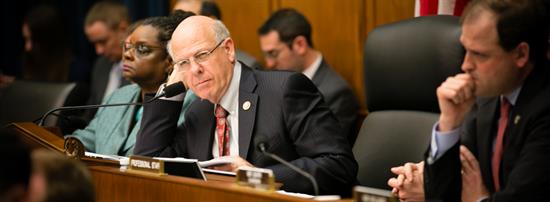Joint Subcommittee Hearing Examines Iran Sanctions
Washington,
April 4, 2017
The Monetary Policy and Trade Subcommittee and the Terrorism and Illicit Finance Subcommittee held a joint hearing Tuesday to examine the effectiveness of non-nuclear U.S. sanctions on the Islamic Republic of Iran. The subcommittees heard from several witnesses about whether new designations or sanctions related to terrorism, human rights abuses, and other non-nuclear behavior could be necessary to further halt Iranian offenses and reduce illicit financing risk internationally. “Today’s joint hearing made it clear that the current non-nuclear sanctions have not been effective in deterring Iran’s illicit behavior. We must do more to stop Iran’s support of terrorism, weapons procurement and testing, and regional destabilization. As the Chairman of the Monetary Policy and Trade Subcommittee, I look forward to continuing our work to make these sanctions more effective in undermining Iran’s capabilities and to influence Iranian policies.” said Monetary Policy and Trade Subcommittee Chairman Andy Barr (R-KY). Terrorism and Illicit Finance Subcommittee Chairman Steve Pearce (R-NM) added, “Today’s joint subcommittee hearing began a much needed conversation to assess the current state of Iran’s non-nuclear sanctions. Despite our nation’s best efforts to cut off Iran’s funds and supplies, Iran has continued to grow as the global leader in terror financing and aid. This is one of many hearings to come for the Subcommittee on Terrorism and Illicit Finance, as we work to interrupt the financial support of national security threats. I thank Chairman Barr for holding this important hearing with me, and I look forward to continuing this conversation for the security and safety of American taxpayers.” Key Takeaways from the Hearing:
Witness Quotes: “For policymakers to successfully combat Iran’s non-nuclear threats, they must be cognizant that they are operating in a world where a nuclear deal is accentuating those threats. From the moment Iran agreed to the JCPOA in July 2015, it gambled that it would have enough leverage against the international community to continue its destabilizing activities relatively unencumbered. To counter this and prove Iran wrong, the U.S. must use coercive diplomacy underwritten by a whole-of-government approach.” – Mr. Behnam Ben Taleblu, Senior Iran Analyst, Foundation for Defense of Democracies “Congress and the Trump administration should instruct the intelligence community to ascertain whether Iran Air is an active participant in the Syria airlifts. Provided this involvement is confirmed, the administration should then re-designate Iran Air under Executive Order 13224 (and possibly under Syria related executive orders) for its material support to the IRGC-Quds Force and Hezbollah in Syria.” – Dr. Emanuele Ottolenghi, Senior Fellow, Foundation for Defense of Democracies “For nearly four decades, Iran has worked to undermine our allies and reshape the region in its image. No factor fuels sectarianism and breeds instability in the Middle East more than Tehran’s foreign policies and the IRGC’s activities. To combat this critical threat, the United States must arm itself with the will and capacity to follow through on effective strategies, beginning with smarter non-nuclear sanctions.” – J. Matthew McInnis, Resident Fellow, AEI ### |


